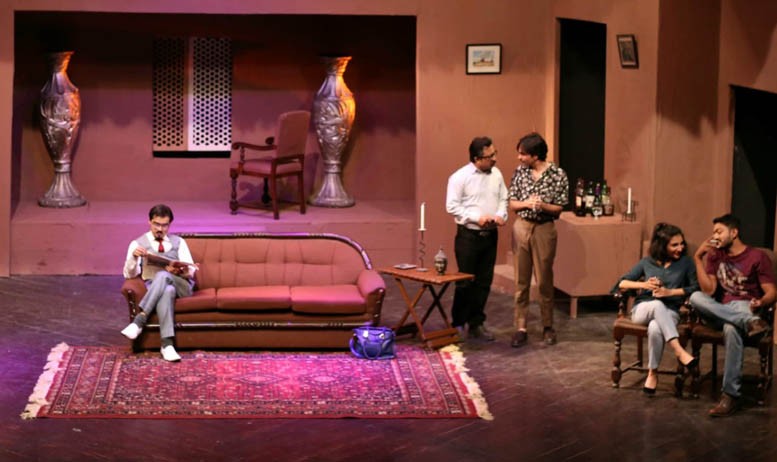
Last week, Aks Theatre and Lahore Arts Council staged Jaal, an adaptation of Agatha Christi’s And Then There Were None

One wonders whether there is another way of presenting Agatha Christi on stage. She was a very conventional writer, in the sense that she followed the stated conventions of writing fiction. The experimentations taking place during her long life did not unduly perturb her.
Needless to say, she was hugely successful. Her novels sold well throughout her life to make her one of the best sellers for a reading public that thrived on thrill, mystery and sensation, all told in a conventional narrative. Usually billed as crime thrillers, these writings, though easy to read, grazed the larger issues that characterised the post-World War II in the West.
Agatha Christi knew how to keep suspense alive. She wrote some plays and crafted some of her novels for the stage herself. Her play, Mousetrap, is said to be the longest running play ever. And Then There Were None was staged when Christi transformed it from a narration to a play.
Adapted into Urdu and titled Jaal, the play was conceived by Afzaal Nabi in a conventional manner. It had a box set and the props were according to the conventions of a drawing room setting. The tone of the direction was taken entirely from drawing room comedies with a realistic set, realistic props and a backdrop that did what it does in conventional plays.
The lighting too was in the mode of traditional design. It was used only to brighten up the action on stage and not put to alternative uses, like substituting for sets and props -- in the manner of some directors under the influence of the concept of lighting and direction as initiated by Edward Gordon Craig.
None of this take away from the production of the play, which was handled competently by the directors and the actors. If there is one word that describes the production, it was competence. The play progressed smoothly without any glitches, or an impression that the effort was under rehearsed, or was not marching the right tempo. But, then, plays which have been performed time and again world over, need another insight at the directorial level to become engaging and more than passable.
In terms of technological innovation, the sound and lighting on stage, as indeed in films, has undergone major changes. With technology becoming cheaper and readily available, they have become easier to be made part of the production than they were a few decades ago -- when they were expensive and cumbersome to set up. Given the greater access such equipment is used imaginatively to design a production on stage. Even if the play is conventional and follows the rules laid down by dramaturgy, the production can be given a new verve. Even if an experiment fails or does not achieve the intended impact, it is still better than not to experimenting at all. Experimentation has taken place in our theatre practice in the past. With scripts written in the mould of how theatre was conventionally conceived, it is perhaps better to experiment, than not.
The cast of the play included Sarfaraz Ansari, Zohaib Haider, Gulshan Majid, Zaheer Taj, Aman Chaudry, Sultan, Imran Armani, Azeem Noor, Hasan Raza and Zoya Qazi, a combination of the young and more experienced as performers like Sarfraz Ansari have more often than not acquitted themselves well as he did in this performance.
AKS Theatre has been staging plays for many years now. It is well versed in what theatre requires -- in terms of production and also what should be presented when and to whom. Its productions have been good in the past too, like Baanjh, which was gripping and sad. So was the collage of Manto’s writings in Manto Sey Milye, which was also directed by Afzaal Nabi.
Alhamra should be felicitated for playing an active role in the promotion of theatre. Recently it launched a theatre-on-wheels, or mobile theatre, which performs at various sites in the cities. It has also become more regular in holding theatre festivals and plays for youth. It is hoped that with greater quantity, quality will emerge. It is still the same hope that is held sanguine.